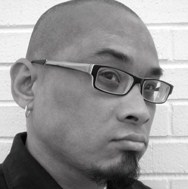W. Todd Kaneko

W. Todd Kaneko is the author of The Dead Wrestler Elegies (Curbside Splendor 2014) and co-author with Amorak Huey of Poetry: A Writers' Guide and Anthology (Bloomsbury Academic 2018). His poems and prose have appeared in The Normal School, Barrelhouse, Gulf Coast, SmokeLong Quarterly, The Rumpus and many other places. A Kundiman fellow, he is co-editor of Waxwing magazine and lives in Grand Rapids, Michigan where he is an Assistant Professor at Grand Valley State University.
My Father on the Telephone
I telephoned my father last night
but I got his voice mail. When he is gone,
there will be no record of his voice
except for the messages he has left me.
Death is not an airplane ticket,
not a motorcycle a man can straddle
and ride into the night. I telephoned
my father last night and he said fatherhood
means your children come first in your life
forever and life is the opposite of sickness.
He didn’t really say any of those things
because when I telephoned my father
last night, I left a message saying I wanted
to visit him when he is feeling better.
I listened to my son playing outside
today, his throaty squeals are sounds
that must mean bird or spider
or motorcycle in whatever language
babies speak. He doesn’t yet have a word
for cancer. Neither of us do.
My Father on the Island
Somewhere in time, my father
is stilly dying, trapped
in cardiac arrest, the body’s
stop, the blood. When I last
saw him, he was asleep,
refrigerator cold and waiting
for me to arrive. In mid-morning
I receive a phone call—he’s gone
my sister says through leagues
of water and everything in the world
is garbled except for the ocean’s
roar, the birds in flight, the rest of
the animals headless on the beach.
My father is not a man
to be trapped, but there he lies
in a hospital bed struggling
to take a breath, the end gasp,
the blood. When I last saw him,
I thought I could see his chest rise.
I lay my head across his chest
and from his mouth, the blood,
the blood, the blood. I wipe his chin
with a tissue and I don’t know
how to put it all back inside him.
I imagine my father at the shore,
teaching me how to skip
stones across the water, the wind
up, the back spin, the release.
THE DAY AFTER
The seagull’s cry echoes
up and down the dock as you wait
in your car for the morning ferry
back to Seattle from the island.
The bird is not an Underworld sentry,
not the eater of souls.
But it is
perched on the toll booth, dark
eyes fixed on you, demanding
tribute—a crust of bread, half
a hot dog, the best seven years
of your life.
Last night, you held
your father’s body and said to him
all those things you never wanted to
say to anyone—apologies, mostly,
then animal sounds, claws and teeth
where your heart once glinted.
There is no ravenous spirit like that
of the grief stricken, no vicious hollow
like the insides of a boy searching
for his father.
The ferry arrives in fifteen
minutes, time enough for you to buy
some chips from the vending machine
and scatter them in the road.
Just sit
and listen to the birds’ panicky calls
to one another from where they perch.
They say, I’m over here—
no, over here.
Funeral Song
After you are gone
I can’t come back—
the last man on earth
with nothing to lose but the feeling
of the syllables of your name
in my mouth.
I try to keep them safe
like the jawfish hides her brood
lips pursed tight and trying
not to swallow.
The ocean knows
how difficult it is to contain so much
life in the body until it’s time
for release, how easy it is
to open my mouth
and feel the fish wriggle free
only to watch them all
drown in the air.
Elegy for Absent Fathers
Your father is a song you sing
at night when your son refuses to sleep.
Your father is a silence
in which you hear your own voice
saying nothing.
Your father is an island—
listen to the waves lapping
at the shore, the echoes of seagulls
off his coast crying his name.
You see them from the beach,
a dirty cloud of feather and beak
and then they are invisible once more.
Your father is a herd of deer
wandering roadside, an orchestra
of crickets at dusk, a swarm of meteors
crossing the sky overhead.
Ask yourself why your father can’t
just be your father. Ask yourself
where he is going before he is gone.

